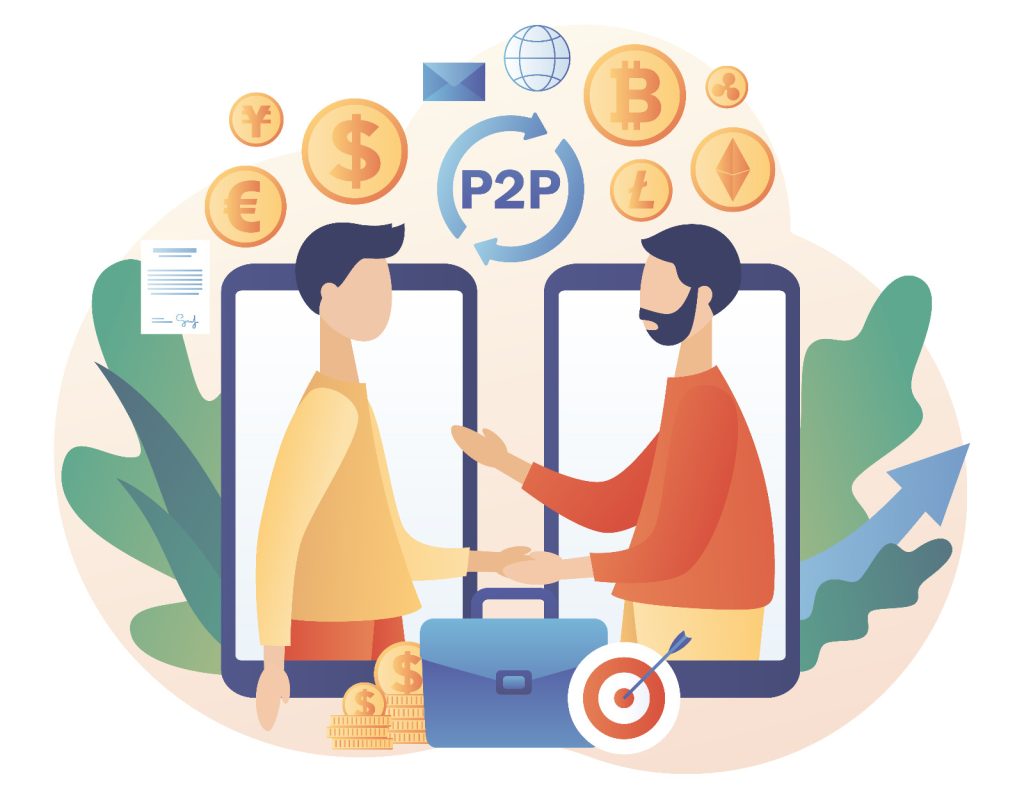Peer-to-peer (P2P) trading marks a significant evolution in commerce, democratizing trading interactions by directly connecting buyers and sellers without the need for a centralized authority or intermediary. This form of trading has been increasingly prevalent in various sectors, particularly with digital assets like cryptocurrencies. The philosophy behind P2P trading resonates with the overarching themes of autonomy, decentralization, and personal agency.
P2P trading leverages modern technology to seamlessly facilitate direct trading relationships across a broad global network. Not limited by geographic boundaries or institutional constraints, P2P trading connects individuals based on their trading needs and preferences. This approach removes the traditional gatekeepers from the equation, empowering individuals to directly negotiate their terms and trade.
The Fundamentals of P2P Trading: How It Stands Apart
The defining characteristic of P2P trading is its directness. Unlike traditional trading platforms where a central authority governs transactions, P2P trading eliminates the need for a middleman. This decentralized framework leads to multiple unique benefits that set it apart from conventional trading systems.
Transparency is one crucial advantage of P2P trading. Since transactions occur directly between parties, each has a comprehensive understanding of the terms and conditions, minimizing the risk of hidden charges or caveats. The open architecture of P2P trading platforms also allows for increased competitive pricing, driven by the pure dynamics of supply and demand, free from any manipulation by a central authority.
Another key aspect is accessibility. Traditional financial institutions often have restrictions based on geographical location, credit history, or minimum capital requirements. P2P trading removes these barriers, providing a global marketplace that is accessible to anyone with an internet connection. Moreover, it provides an opportunity for unbanked or underbanked individuals to participate in the global economy.
The Mechanics of P2P Exchanges
To help you understand better, let’s imagine a P2P exchange like the Facebook Marketplace. Both aim to connect buyers and sellers. However, where the Marketplace might leave you open to untrustworthy transactions, P2P exchanges work diligently to reduce fraud risks.
Though P2P trading provides numerous benefits, it comes with its share of challenges, the most significant being trust and security. To address this, P2P exchanges employ various mechanisms to ensure seamless and safe trading.
One such mechanism is the use of smart contracts, programmable contracts that automatically execute when predefined conditions are met. These contracts can ensure that the terms agreed upon by both parties are upheld, reducing the risk of fraudulent transactions.
To achieve this, P2P exchanges provide protective measures like secure escrow services and comprehensive rating systems. These features increase trust between traders. For instance, with Binance P2P trading, your Bitcoin is safely held in escrow until you confirm receiving the payment. This way, P2P exchanges make trading both seamless and safe.
Advantages of P2P Trading: Why It’s a Favored Choice


With P2P trading, you gain access to a global marketplace of cryptocurrency buyers and sellers. That’s just one of its numerous benefits. With hundreds of payment methods at your disposal, including in-person cash payments, the world becomes your trading floor.
Peer-to-Peer (P2P) trading has been gaining significant traction due to its inherent benefits, making it an appealing alternative to traditional trading models. Here are some of the key advantages:
- Decentralization: By eliminating the need for a centralized authority or intermediary, P2P trading empowers individuals, allowing them to retain full control over their assets and transactions.
- Cost-efficiency: Since P2P trading bypasses the traditional middlemen, it typically results in lower transaction fees. The competitive marketplace often leads to better pricing as well.
- Accessibility: P2P platforms are generally accessible to anyone with an internet connection, regardless of their geographical location. This opens up financial opportunities for the unbanked and underbanked populations, who can participate in trading activities traditionally beyond their reach.
- Transparency: All transactions in a P2P trading platform are visible to all its participants, fostering trust and confidence in the system.
- Flexibility: P2P trading platforms are often built with flexibility in mind, accommodating a wide range of assets and payment methods. This increases the variety of potential trading pairs, thus increasing the chances of successful trades.
Disadvantages of P2P Trading: The Trade-offs
As with any trading method, P2P trading also has its trade-offs. Transactions can sometimes take longer due to the need for mutual confirmation from both parties. Furthermore, P2P exchanges may have lower liquidity than CEXs, posing challenges for those looking to make larger trades. However, savvy traders have found their way around these potential downsides, and so can you.
- Scalability Issues: As every transaction is managed on an individual basis, the system can face scalability issues. High volumes of trading activity may lead to slower transaction speeds and increased costs.
- Risk of Fraud: Although mechanisms like escrow services and smart contracts reduce the risk of fraudulent transactions, no system is foolproof. P2P platforms, due to their decentralised nature, could potentially be more susceptible to certain types of scams or fraud.
- Technical Complexity: To fully benefit from P2P trading, users often need to have a certain level of technical knowledge. This could act as a barrier to entry for those unfamiliar with the digital landscape.
- Customer Support: Centralized trading platforms often provide immediate customer support. In contrast, P2P platforms might lack the same level of customer service, which could be problematic in the event of a dispute or technical issue.
- Price Volatility: Due to the absence of a central authority that can intervene in market operations, P2P platforms could experience significant price volatility.
- Regulatory Uncertainty: P2P trading, especially in the field of cryptocurrencies, often operates in a regulatory grey area. As governments worldwide are still figuring out how to best regulate these platforms, users face the risk of sudden policy changes that might affect their investments or trading activities.
Is P2P Safe?
In a word: yes. Modern P2P exchanges have made significant strides in security measures. Platforms like Binance P2P boast robust escrow services, frequent security updates, and stringent identity verification processes. Still, as with any investment, trading on P2P platforms comes with risks. As long as you tread wisely, the world of P2P trading holds immense potential.
P2P Trading: A Pot of Gold for the Skillful


With P2P trading, you can tap into profitable avenues such as arbitrage with fiat or between different exchanges, and posting personalized buy and sell ads. With the wide array of currencies and exchanges at your disposal, you can potentially profit from price differences, or even make a profit by setting a higher selling price.
P2P trading platforms can offer considerable financial gains for those who understand and navigate their intricacies proficiently. Successful traders often leverage these platforms’ unique attributes to generate substantial returns.
- Profit from Volatility: P2P trading can provide a fertile ground for traders looking to benefit from price volatility. The fluctuations in prices can offer lucrative opportunities for those adept at timing the market and managing risks.
- Arbitrage Opportunities: The P2P marketplace, due to its decentralized nature, may exhibit price discrepancies across different regions or platforms. Traders with a keen eye can spot these variations and profit from arbitrage – buying low in one place and selling high in another.
- Trading Various Assets: The flexibility of P2P platforms enables the trading of a wide variety of assets, extending beyond traditional financial instruments. This allows traders to diversify their portfolio and potentially realize greater profits.
- Gaining from Direct Negotiation: Since P2P trading is direct between parties, skilled negotiators can capitalize on their abilities to secure favorable terms.
- Fee Optimization: By understanding the fee structures of different platforms, traders can minimize their transaction costs, thus maximizing net profits.
Embracing the Future of Trading
The dawn of peer-to-peer (P2P) trading has signaled a new era of democratized, accessible, and transparent commerce. This trading paradigm offers significant advantages over traditional systems, including enhanced transparency, global accessibility, and the empowering ability to conduct transactions without intermediaries.
While it’s true that P2P trading comes with its own set of challenges, such as potential scalability issues, risk of fraud, and regulatory uncertainties, the field is rapidly evolving to address these concerns. Innovations like robust escrow services, smart contracts, and comprehensive security protocols are continually enhancing the safety and trustworthiness of P2P exchanges.
Furthermore, for those with the right skills and understanding, P2P trading offers a potentially profitable arena. With opportunities for arbitrage, a vast array of assets to trade, and the freedom to negotiate directly, traders can leverage P2P platforms to generate substantial returns.
In a nutshell, P2P trading represents not just the future of commerce, but also a significant opportunity for individuals across the globe to engage in financial activities that were once out of their reach. As we continue to witness the evolution of P2P trading and its potential impacts, the focus remains on enabling a truly decentralized, secure, and egalitarian trading environment. So, whether you’re an experienced trader or a beginner embarking on your trading journey, the world of P2P trading holds a wealth of opportunities just waiting to be explored.









